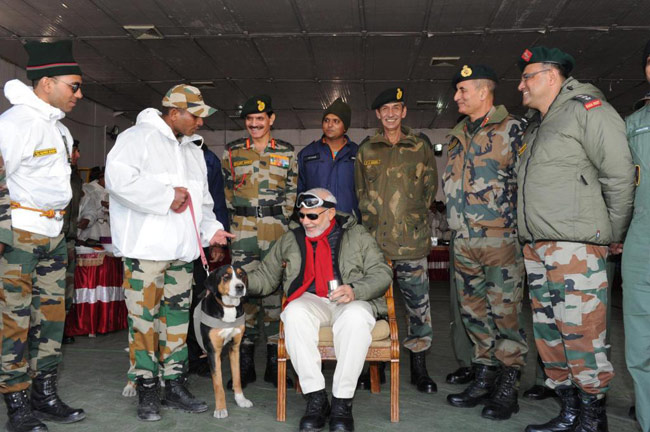PM Modi's Visit Places Siachen Outside Scope of India-Pak Bilateral Agenda
PM Modi interacts with soldiers in Siachen

NEW DELHI: Prime Minister Narendra Modi’s visit to Siachen was a firm signal to Pakistan and the world that his government, unlike earlier, will not be negotiating any withdrawal of troops from the glacier with Pakistan.
The Prime Minister said he was glad to have the opportunity to see in what difficult conditions the troops lived at the heights. "Everyone is aware of the extreme conditions at Siachen. Overcoming every challenge our soldiers stand firm, protecting our motherland," Modi earlier tweeted.
"Be it the altitude or bitter cold, nothing deters our soldiers. They stand there, serving our nation. They make us truly proud."
He said he had "a message from each and every Indian to our soldiers: that we stand shoulder to shoulder with you…” A recognition of the conditions was also a clear indication that this would not be the reason for any withdrawal from the heights, and that the Indian Army presence at Siachen was part of “protecting our motherland.”
Those advocating a resolution of Siachen, both in India and Pakistan, have usually cited the extreme weather conditions as a reason. The two countries have discussed the issue threadbare in the composite dialogue with the Indian Army registering its strong opposition to any ‘solution’ requiring withdrawal of troops from Siachen. Senior Army officers had earlier told this writer that if this was a permanent solution with foolproof guarantees it could be considered but that in the military assessment, “this is not going to be the case.”
The Indian Army has also pointed in briefings to the UPA government that was seriously considering a resolution that after decades it had managed to overcome the weather conditions to a point where casualties were now at a minimum. “We can stay up there now without great difficulty,” the Army according to sources informed the government, “but if you get us down now, and later tell us we have to go back to reclaim the heights because the Pakistani troops have moved in or are moving in, the losses will be too huge to consider even.” In other words, according to the Army, it was not prepared to suffer the consequences of “ill conceived” political decisions.
India and Pakistan had both claimed forward movement on Siachen. To a point where the executive under then Prime Minister Dr Manmohan Singh had started consultations with the Army that had recorded its objections strongly. Pakistans former foreign minister Khurshid Kasuri had hinted at a solution on Kashmir having been worked out, with Islamabad sources being quoted in the local media there as saying that Siachen was actually the easiest part of the agreement. The general feedback that found its way into the media as well at the time was that the differences on the issues being discussed under the composite dialogue had been narrowed, and Siachen was one of these. However, of course there was no official confirmation just ‘leaks’ to the media in both countries. And later Kasuri’s assertion, when he was no longer the foreign minister of Pakistan, that a breakthrough had been imminent.
The RSS and BJP position has moved away now from the dialogue process altogether with firing on the Line of Control ending the ceasefire, and opening new levels of animosity again. There is no word of resuming the dialogue after New Delhi cancelled the scheduled foreign secretaries meeting earlier. Back channels are also silent with efforts to reduce tensions and narrow differences virtually at a standstill. There is no indication if and when these will be taken up, with decision making having moved out of the Ministry of External Affairs into the Prime Ministers office.



